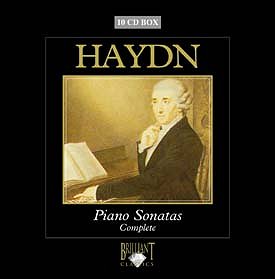






Franz Joseph HAYDN (1732-1809)
Complete Piano Sonatas
DISC 1 Î:
Sonata in B flat major, Hob. XVI/41 (ca 182/84)
Sonata in E flat major, Hob. XVI/16 (before 1766)
Sonata in B flat major, Hob. XVI/2 (before 1766)
Sonata in B minor, Hob. XVI/32 (1776)
Sonata in A flat major, Hob. XVI/46 (ca 1768)
DISC 2 Î:
Sonata in D major, Hob. XVI/33 (1771/73)
Sonata in C major, Hob. XVI/1 (before 1776)
Sonata in A major, Hob. XVI/12 (before 1776)
Sonata in D major, Hob. XVI/42 (ca 1782/84)
Sonata in C major, Hob. XVI/50 (1794/95)
DISC 3 Ï:
Sonata in G major, Hob. XVI/G1 (before 1766)
Sonata in C major, Hob. XVI/3 (before 1766)
Sonata in E major, Hob. XVI/13 (before 1766)
Sonata in A major, Hob. XVI/30 (1776)
Sonata in G minor, Hob. XVI/44 (1768/70)
Sonata in A flat major, Hob. XVI/43 (1771/73)
DISC 4 Ï:
Sonata in C major, Hob. XVI/10 (before 1766)
Sonata in A major, Hob. XVI/5 (before 1763)
Sonata in E major, Hob. XVI/22 (1773)
Sonata in D major, Hob. XVI/37 (1777/79)
Sonata in E flat major, Hob. XVI (49 (1789/90)
DISC 5 Ð:
Sonata in C major, Hob. XVI/7 (before 1766)
Sonata in E minor, Hob. XVI/47 (before 1766)
Sonata in F major, Hob. XVI/23 (1773)
Sonata in G major, Hob. XVI/27 (1776)
Sonata in E flat major, Hob. XVI/52 (1794)
DISC 6 Ð:
Sonata in G major, Hob. XVI/11 (before 1766)
Sonata in D major, Hob. XVI/19 (1767)
Sonata in C major, Hob. XVI/35 (1779/79)
Sonata in E minor, Hob. XVI/34 (1781)
Sonata in D major, Hob. XVI/51 (1794)
DISC 7 Ñ:
Sonata in D major, Hob. XVI/D1 (before 1766)
Sonata in D major, Hob. XVI/24 (1773)
Sonata in E flat major, Hob. XVI/25 (1773)
Sonata in F major, Hob. XVI/29 (1774)
Sonata in G major, Hob. XVI/39 (1780)
DISC 8 Ñ:
Sonata in E flat major, Hob. XVI/45 (1766)
Sonata in B flat major, Hob. XVI/18 (ca 1766/67)
Sonata in E flat major, Hob. XVI/38 (1777/79)
Sonata in G major, Hob. XVI/40 (ca 1782/84)
Sonata in C major, Hob. XVI/48 (1789)
DISC 9 Ò:
Sonata in C major, Hob. XVI/21 (1773)
Sonata in C minor, Hob. XVI/20 (1771)
Sonata in A major, Hob. XVI/26 (1773)
Sonata in D major, Hob. XVI/4 (before 1776)
Sonata in E major, Hob. XVI/31 (1776)
Disc 10 Ò:
Sonata in E flat major, Hob. XVI/28 (1776)
Sonata in C sharp minor, Hob. XVI/36 (1777/79)
Sonata in D major, Hob. XVI/14 (before 1766)
Sonata in G major, Hob. XVI/6 (before 1766)
Sonata in F major, Hob. XVI/9 (before 1766)
Sonata in G major, Hob. XVI/8 (before 1766)
![]() Bart van Oort, fortepiano
Î
Bart van Oort, fortepiano
Î
Ursula Dütschler, fortepiano Ï
Stanley Hoogland, fortepiano Ð
Yoshiko Kojima, fortepiano Ñ
Riko Fukuda, fortepiano Ò
Recorded: Maria Minor, Utrecht, September/October 2000
![]() BRILLIANT CLASSICS 99817
[647:13]
BRILLIANT CLASSICS 99817
[647:13]
BUY NOW
Crotchet AmazonUK AmazonUS